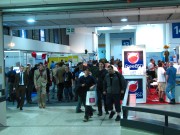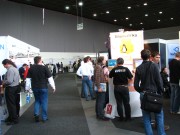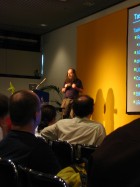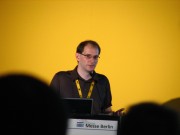LinuxTag 2007
I visited the LinuxTag1) here in Berlin today. I went with Frank and his colleague Henri and it has been an interesting day for us.
 After having a coffee, we went for a walk through the two halls of exhibitors. We had an interesting talk with Cornelius Kölbel of LSE about one time password (OTP) generators and smartcards. They sell a nice OTP token with a USB connector which allows you to initialize the token yourself, which is quite different to competing products which usually are seeded on production time. LSE also provides additional services and software like a GPLed OpenRadius extension for use with OTP based auth – nice if you want to avoid the Active Directory based software usually used with these tokens.
After having a coffee, we went for a walk through the two halls of exhibitors. We had an interesting talk with Cornelius Kölbel of LSE about one time password (OTP) generators and smartcards. They sell a nice OTP token with a USB connector which allows you to initialize the token yourself, which is quite different to competing products which usually are seeded on production time. LSE also provides additional services and software like a GPLed OpenRadius extension for use with OTP based auth – nice if you want to avoid the Active Directory based software usually used with these tokens.
The mentioned OTP token device costs about 80 Euro. Frank and me later thought about if implementing a OTP generator as Java applet for mobile phones could be a cheaper alternative. Does anyone know if such software already exists?
We then went to the first lecture, called Rathaus 2.02) and held by Horst Braeuner. Braeuner talked about their experience with using Open Source for the municipal management of the 36000 people town Schwäbisch Hall. They switched from a Microsoft Exchange based system to Open-Xchange in 2005. Today they're running Linux on the desktop as well. He was quite enthusiastic with no regrets so far.
 The next lecture was about a cool tool called SystemImager which is used to install Linux images to many machines in an automated way. The presentation was held by Andrea Righi, who works for Italy's biggest super computing center with a few thousand node cluster (the 44th fastest computer in the world). Andrea introduced us to a new transport backend for SystemImager based on the BitTorrent protocol which outperforms the traditional rsync backup by a multitude without having the problems of the multicast backend. In his example he was able to distribute an image to 150 nodes simultaneously in less than 5 minutes.
The next lecture was about a cool tool called SystemImager which is used to install Linux images to many machines in an automated way. The presentation was held by Andrea Righi, who works for Italy's biggest super computing center with a few thousand node cluster (the 44th fastest computer in the world). Andrea introduced us to a new transport backend for SystemImager based on the BitTorrent protocol which outperforms the traditional rsync backup by a multitude without having the problems of the multicast backend. In his example he was able to distribute an image to 150 nodes simultaneously in less than 5 minutes.
After that we went to a presentation on a messaging/chat system called psyc. It was held by Stephen R. van den Berg3) and the inventor of psyc – Carlo v. Loesch. Unfortunately the presentation was a bit unstructured so it was hard to grasp what the system actually is. From what I understood it is basically a chat server speaking it's own very simple UDP-based protocol with lot's of interfaces to other protocols to deliver the messages. So if you want to send a notification about something (like “you got mail”), you can simply send a very simple UDP package to a psyc server and the server then will distribute this to your desired channel. This channel can be a Jabber account, an IRC channel or whatever you want. Von Loesch showed an example of a MediaWiki plugin to do notifications through psyc which had not more than 30 lines of code. Unfortunately the psyc website is really hurting my eyes, so it's no fun to find out what psyc is really capable of.
 After the psyc session we went for a little lunch and a beer, to then continue attending the lecture program with a really interesting and funny presentation by Alan Cox. He talked about the development of the LibATA drivers in the Linux kernel. It was the first time I saw Alan live and he seems to be a really cool guy. Even though I'm not very knowledgeable about the inner workings of the Linux driver stack or hard drive technology, I was easily able to follow his presentation. In the Q&A session after his talk he gave two very valuable tips when asked about laptop power management and hard drives. He suggested to always mount your disks with the
After the psyc session we went for a little lunch and a beer, to then continue attending the lecture program with a really interesting and funny presentation by Alan Cox. He talked about the development of the LibATA drivers in the Linux kernel. It was the first time I saw Alan live and he seems to be a really cool guy. Even though I'm not very knowledgeable about the inner workings of the Linux driver stack or hard drive technology, I was easily able to follow his presentation. In the Q&A session after his talk he gave two very valuable tips when asked about laptop power management and hard drives. He suggested to always mount your disks with the noatime mount option and to use a tool called powertop to get an idea what keeps your hard drive spinning up.
Alan finished early so we hopped over to get the second part on the virtualization talk held by Werner Fischer in the neighboring hall. Fischer works for Thomas Krenn – my favorite seller of 19“ server hardware. He talked about a quite attractive alternative to virtualization software like Xen called OpenVZ. OpenVZ is quite different to Xen because it only runs one Kernel, but is much more resource efficient than Xen.
After that I went to a report on the experiences of using a wiki for knowledge management in a government institution for counseling unemployed youths. They use MoinMoin and are very happy with it. There wasn't much new to learn for me here and I left early to get the rest of an talk about Asterisk by Stefan Wintermeyer. He is a very entertaining speaker. He gave a really balanced talk showing common problems with using Asterisk as well as the advantages of it over propritary VoIP solutions. He also mentioned his GNU-FDL licensed book on Asterisk which is available online.
 The last talk I attended was given by Debian developer Martin Michlmayr about running Debian on inexpensive NAS devices. He especially recommended two devices, the very cheap Linksys NSLU2 and the more expensive Thecus N2100. Especially the NSLU2 seems to be a cool machine if you need a controller for some simple services. As example he mentioned people who use it to power certain sensors to measure data over a long time (like a waether station).
The last talk I attended was given by Debian developer Martin Michlmayr about running Debian on inexpensive NAS devices. He especially recommended two devices, the very cheap Linksys NSLU2 and the more expensive Thecus N2100. Especially the NSLU2 seems to be a cool machine if you need a controller for some simple services. As example he mentioned people who use it to power certain sensors to measure data over a long time (like a waether station).
As I said it was a very interesting day. I will be probably visiting the LinuxTag next year again…